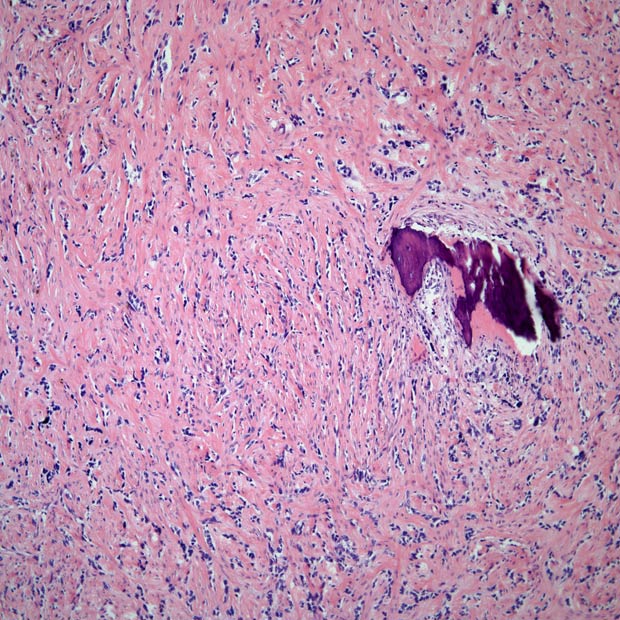FDA Grants ODD to Investigational Oral CDK9 Inhibitor for Ewing Sarcoma
TP-1287 is under investigation as part of a phase 1 study in patients with metastatic or progressive solid tumors, including Ewing sarcoma, that are refractory or intolerant to other established therapies.
The FDA has given TP-1287, an investigational oral CDK9 inhibitor, orphan drug designation for the treatment of patients with Ewing sarcoma, according to a press release from Sumitomo Pharma.
By downregulating c-MYC and MCL-1, it may be possible to achieve apoptosis in different kinds of tumor cells with TP-1287.

The regulatory organization also gave TP-1287 rare pediatric disease designation. An ongoing phase 1 trial (NCT03604783) is evaluating the efficacy of TP-1287 in a population of patients with metastatic or progressive solid tumors that are refractory or intolerant to other available therapies. This includes patients with sarcoma, Ewing sarcoma, dedifferentiated liposarcoma, and synovial sarcoma.
“We are delighted to have received this designation for TP-1287 which underscores the need for additional treatment options for patients with Ewing sarcoma,” Patricia S. Andrews, chief executive officer and global head of oncology at Sumitomo Pharma Oncology, Inc., said in the press release.
TP-1287 was designed as an investigational oral phosphate prodrug of alvocidib, a CDK9 inhibitor. Alvocidib is able to bind at the ATP binding site of CDK9, which interrupts CDK9’s phosphorylation. This reduces messenger RNA in certain genes such as c-MYC and MCL-1. By downregulating c-MYC and MCL-1, it may be possible to achieve apoptosis in different kinds of tumor cells.
“TP-1287 exhibits potent inhibition of intracellular kinases including CDK9. Inhibition of CDK9 leads to downregulation of key antiapoptotic proteins such as MCL-1, which in turn has been shown to inhibit tumor growth in preclinical models of hematologic malignancies and several tumor types,” Jatin J. Shah, MD, chief medical officer at Sumitomo Pharma Oncology, Inc., explained.
The open-label, dose-escalation, dose-expansion phase 1 trial evaluating oral TP-1287 has an estimated enrollment of 80 patients. The primary end points of the trial are identifying dose limiting toxicities, the maximum tolerated dose, and anti-tumor activity including objective response rate and clinical benefit rate. Secondary end points include finding the recommended phase 2 dose and progression-free survival.
To enroll in the dose escalation portion of the study, patients needed to have histologically confirmed advanced metastatic or progressive solid tumors with the exception of tumors with rapid cell turnover such as small cell cancer, inflammatory breast cancer, medulloblastoma, neuroblastoma, and melanoma with extensive liver metastases. Patients included in this part of the study also needed to be refractory or intolerant to other established therapies shown to provide clinical benefit.
To be included in the dose expansion portion of the study, patients also needed to have undergone treatment with at least 1 but no more than 5 prior lines of treatment including an anthracycline. Moreover, patients needed to have 1 or more measurable tumors, an ECOG performance status of 0 or 1, a life expectancy of 3 months or more, and be at least 18 years of age. Patients also needed to have acceptable liver function, renal function, hematologic status, and coagulation status.
Patients who had a history of congestive heart failure, corrected QT interval, or a seizure disorder necessitating anticonvulsant therapy were not eligible to enroll on the study. Moreover, the presence of symptomatic central nervous system metastases, severe chronic obstructive pulmonary disease, or undergoing major surgery 2 weeks prior to the first day of treatment were additional grounds for exclusion.
Other exclusion criteria included having active and/or uncontrolled bacterial, viral, or fungal infections; infection with human immunodeficiency virus; serious nonmalignant disease; and receiving treatment with any other investigational agent.
Reference
Sumitomo Pharma Oncology receives orphan drug designation for TP-1287, an investigational oral CDK9 inhibitor for the treatment of Ewing sarcoma. News release. Sumitomo Pharma. April 10, 2023. Accessed April 11, 2023. http://bit.ly/3KQYy0A
Sarcoma Awareness Month 2023 with Brian Van Tine, MD, PhD
August 1st 2023Brian Van Tine, MD, PhD, speaks about several agents and combination regimens that are currently under investigation in the sarcoma space, and potential next steps in research including immunotherapies and vaccine-based treatments.